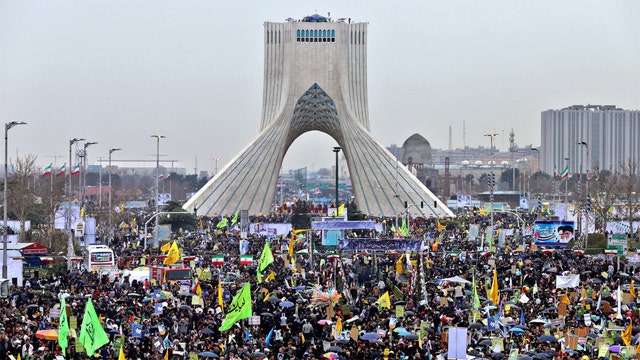Will sanctions relief boost Iran's terror activities?
Ambassador Adam Ereli and Rebeccah Heinrichs on Tehran's potential motives
While keeping Iran from building a nuclear weapon remains the main sticking point in the debate over Iran’s nuclear program, foreign policy experts warn dropping sanctions against Tehran could lead to an uptick in terror activities.
Fox News National Security Analyst KT McFarland spoke with Hudson Institute adjunct fellow Rebeccah Heinrichs and former U.S. ambassador to Bahrain Adam Ereli about Iran’s motives.
Sanctions will “free up extra money to support extremist movements,” warned Ereli. “It doesn’t take a lot of money – Hezbollah, Hamas, the Houthis in Yemen, they don’t need a lot of money… there is plenty to go around.”
Tehran has long been linked to the terrorist groups Hezbollah and Hamas, providing financial assistance and weapons primarily to assist their fight against Israel. Recently, the Iranians have backed Houthi rebels in Yemen against the Saudi-backed central government.
“We should expect some of this money to go toward terrorism … there is no indication the Iranians will change their ways. In fact, the deal states that Iran does not have to – the relief of sanctions is not contingent upon the Iranians changing their ways,” said Heinrichs.
Ereli says Iran’s support for extremism didn’t come up because the “scope of the negotiations was defined to include just Iran’s nuclear power program, not its ballistic missile program, not its support for terror, and, frankly, they wouldn’t have come to the table or agreed to negotiate if we had broadened the agenda.”
The failure to address Iran’s influence in several extremist or rebel movements has increased tensions across the Middle East.
“This deal has basically kicked off what is going to be an arms race in the region because they are going to have to arm themselves, at least conventionally against what is going to be a much more militarily superior Iranian regime,” said Heinrichs.
Ereli says U.S. allies in the region are “worried” that sanctions relief will lead Iran to boost its military budget and resources. U.S. Mideast allies are concerned that Iranians will lead a more aggressive foreign policy in the region.
“Iran is going to do some things that are contrary to this agreement, undermine the commitments it has made,” said Ereli. Looking ahead, “the West will be divided and because of this agreement will not be able to make a firm and tough response.”









































